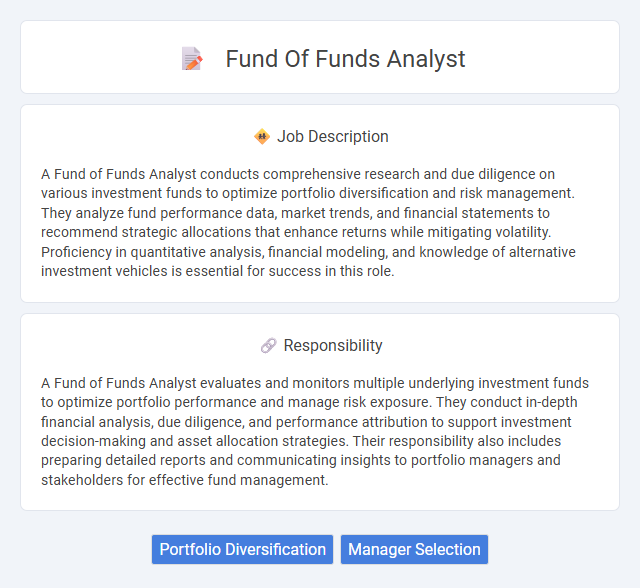
A Fund of Funds Analyst conducts comprehensive research and due diligence on various investment funds to optimize portfolio diversification and risk management. They analyze fund performance data, market trends, and financial statements to recommend strategic allocations that enhance returns while mitigating volatility. Proficiency in quantitative analysis, financial modeling, and knowledge of alternative investment vehicles is essential for success in this role.
Individuals with strong analytical skills and a keen interest in financial markets are likely to find the Fund of Funds Analyst role suitable. Those who enjoy comprehensive research, evaluating multiple investment strategies, and possess attention to detail may thrive in this position. Candidates preferring routine or less complex analytical tasks might find this job less aligned with their strengths.
Qualification
A Fund of Funds Analyst requires strong analytical skills, proficiency in financial modeling, and deep knowledge of alternative investments including hedge funds, private equity, and mutual funds. Advanced degrees in finance or economics, such as an MBA or CFA certification, significantly enhance qualifications, alongside experience in portfolio analysis and risk assessment. Mastery of data analysis tools like Excel, Bloomberg, and statistical software is essential for evaluating fund performance and market trends.
Responsibility
A Fund of Funds Analyst evaluates and monitors multiple underlying investment funds to optimize portfolio performance and manage risk exposure. They conduct in-depth financial analysis, due diligence, and performance attribution to support investment decision-making and asset allocation strategies. Their responsibility also includes preparing detailed reports and communicating insights to portfolio managers and stakeholders for effective fund management.
Benefit
A Fund of Funds Analyst likely benefits from gaining comprehensive exposure to diverse investment strategies and asset allocations, enhancing analytical skills across multiple fund types. This role probably offers opportunities to work closely with portfolio managers, improving decision-making abilities in fund selection and risk assessment. There is a strong chance that such experience will increase market understanding and provide a competitive edge in investment management careers.
Challenge
Fund of funds analysts likely encounter challenges in assessing diverse investment vehicles, requiring sophisticated skills to evaluate multiple portfolios simultaneously. They must probably navigate complex market dynamics and regulatory environments, which can complicate performance predictions and risk assessments. The role demands a high probability of adaptability and continuous learning to effectively manage the intricate layers of fund selection and due diligence.
Career Advancement
A Fund of Funds Analyst plays a critical role in evaluating and selecting underlying funds to optimize portfolio performance, leveraging skills in financial modeling and market analysis. Career advancement often leads to senior analyst roles, portfolio management positions, or strategic investment advisory, driven by expertise in risk assessment and asset allocation. Mastery in quantitative analysis and industry knowledge significantly enhances opportunities for leadership roles within investment firms.
Key Terms
Portfolio Diversification
A Fund of Funds Analyst specializes in evaluating and selecting multiple underlying investment funds to build a well-diversified portfolio that minimizes risk and enhances returns. By analyzing various asset classes, market conditions, and fund management performance, the analyst ensures optimal allocation across different sectors and strategies. Portfolio diversification achieved through this role reduces exposure to sector-specific volatility and maximizes long-term capital growth potential.
Manager Selection
A Fund of Funds Analyst specializing in Manager Selection evaluates and identifies top-performing hedge fund and mutual fund managers by conducting rigorous quantitative and qualitative analyses. This role involves deep due diligence on investment strategies, risk metrics, and historical performance to construct diversified portfolios that optimize returns and mitigate risks. Expertise in portfolio theory, market trends, and effective communication with fund managers is essential for successful investment decisions.
 kuljobs.com
kuljobs.com